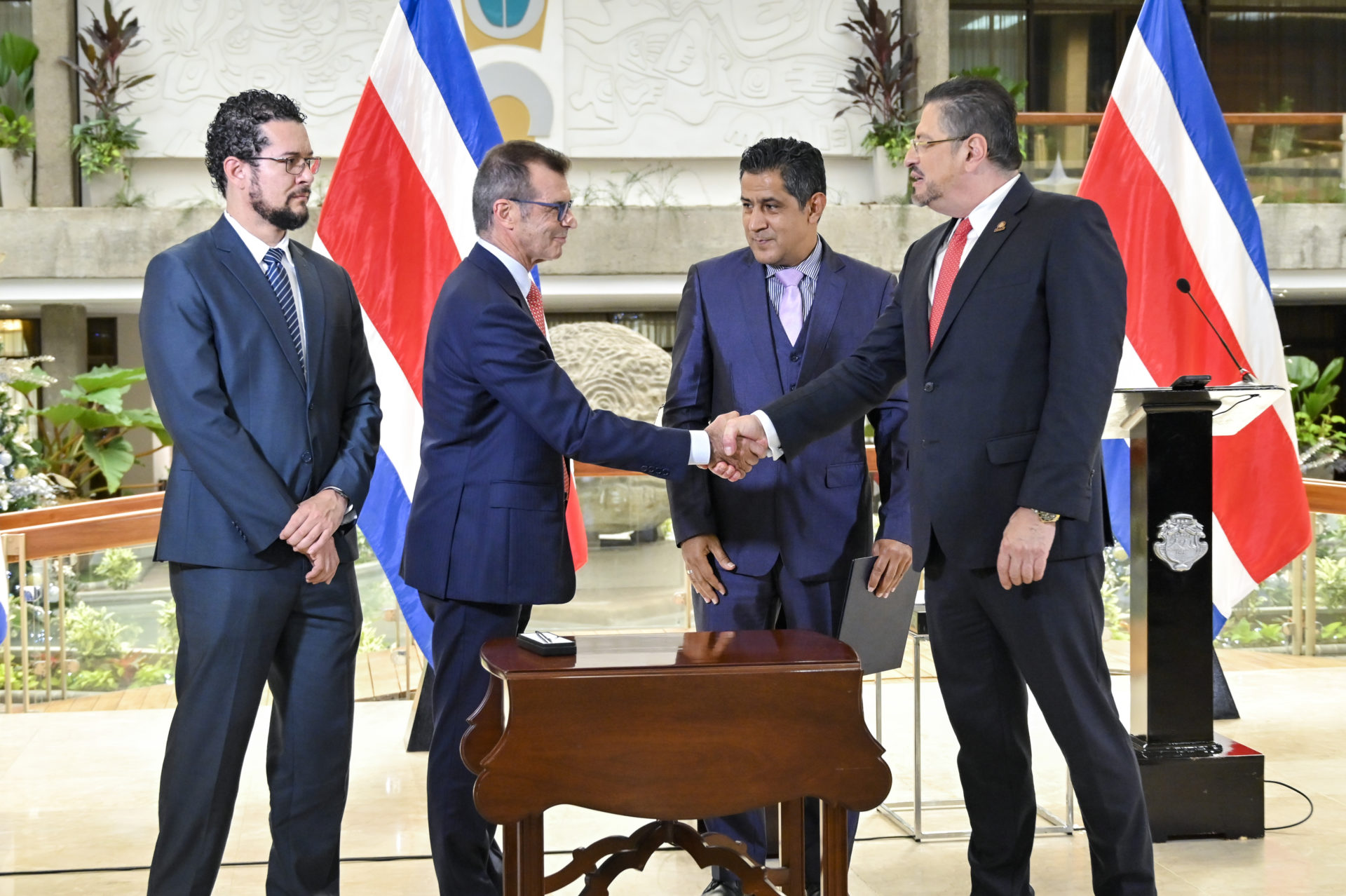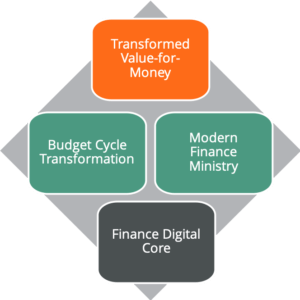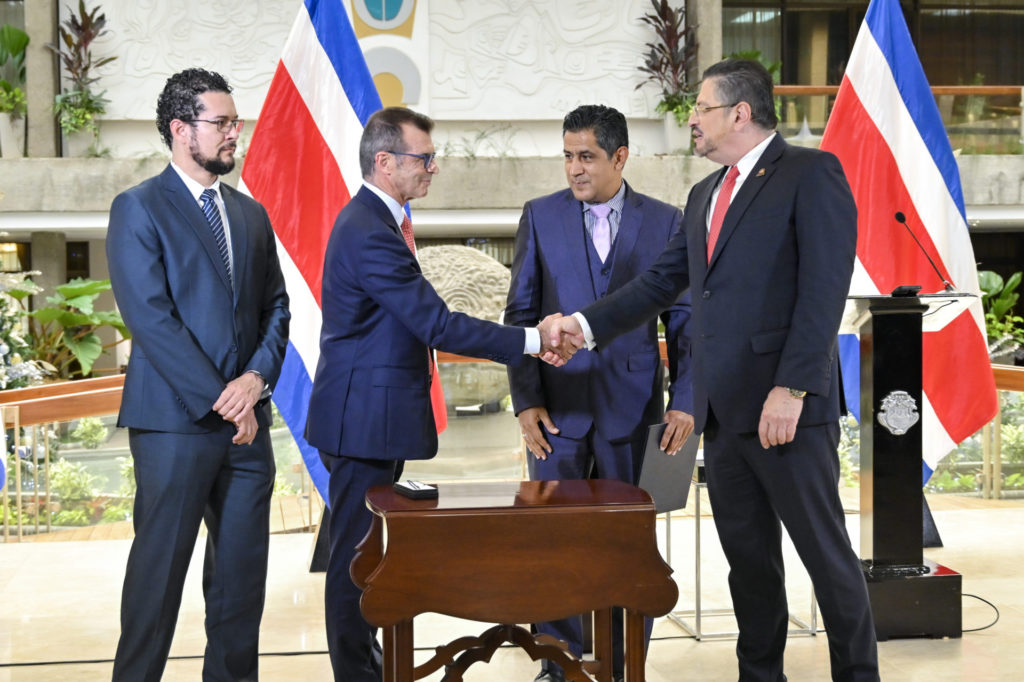At the end of November 2023, FreeBalance’s President and CEO, Manuel Schiappa Pietra, joined the President of Costa Rica, Rodrigo Chaves Robles, and Minister of Finance, Nogui Acosta Jaén, to announce FreeBalance’s role in a comprehensive digital transformation program within the Ministry of Finance.
We will provide our unified government technology platform and specialist government advisory and technical implementation services to help the Government of Costa Rica deliver critical reforms and establish a foundation for improved fiscal and societal outcomes for the citizens.
The project, which is part of a wider program known as Hacienda Digital, will create a new, citizen-centric, digital-by-design approach to transform the Government’s planning, budgeting, public expenditure, accounting, human resource management, reporting and treasury functions.

The Impact of Digital Transformation in Costa Rica’s Ministry of Finance
This project prioritizes efficiency, transparency, and citizen engagement. By transforming government resource planning at the strategic and operational levels, Costa Rican citizens will gain visibility into how public funds are collected and invested, and impact their lives.
Citizens will also benefit from simpler interactions with the government as a result of this project. For example, ministry functions will be streamlined so that citizens don’t have to navigate complexity when trying to manage life events (for example registering a birth or marriage, moving house, retirement, or starting a business).
The project will help public finance leaders in Costa Rica to:
- manage financial and people resources more efficiently and effectively
- increase clarity and predictability in the country’s financial and budgetary systems
- facilitate decision making with a centralized and integrated platform
- more effectively align resources with workload to increase productivity.
This results in improved service delivery, for example ensuring vendor payments, citizen case management, social assistance payments and civil service performance are all seamlessly enacted without the need for duplication of data, manual processes or the risk of fraud or human error.
And performance management is assured, through more effective program integration with national development strategy and the UN Sustainable Development Goals, and better tracking social outcomes against plans for early warnings and agile improvements. Unified analysis of data (supported by AI) also enables more effective decision-making with a standard fiscal metadata structure (a Chart of Accounts linked to Chart of Goals).
The project enables a virtuous cycle of trust in public financial management (PFM), with increased transparency and accountability driving higher revenue mobilization, better service delivery and economic growth.
Ultimately, the digital transformation of the Ministry of Finance supports Costa Rica’s unique Pura Vida (“pure life”) culture, simplifying government fiscal operations and placing citizens at the forefront of service delivery to enhance social outcomes, satisfaction and wellbeing.
Defining True Digital Transformation
Despite vendor hype, very few PFM digital initiatives are transformational. Most only digitize manual processes and therefore don’t deliver the impact needed. Genuine PFM digital transformation occurs when:
- Government effectiveness improves through a) performance management and b) value-for-money structures whose decision analytics enables evidence-driven decision-making
- Modern accountable finance ministries decentralize routine fiscal functions, supporting data literacy and financial management integrated with national development plans
- Budget cycle management systems are interoperable and provide full fiscal insight across tax administration, treasury, procurement, budget planning, PIM units, and aid units
- A robust digital core provides the integrated data for analysis, visualization, forecasting, early warning, risk mitigation, and management alerts.

Institutional reform, and ministry modernization, is a precondition to any major PFM digital transformation journey.
Time for Transformation
The digital transformation project in Costa Rica’s Ministry of Finance is funded by the World Bank, and aims to improve the efficiency, effectiveness and client orientation of tax and customs administration and public expenditure management, through the digital transformation of the Ministry of Finance. But it comes at an important point in the country’s economic development.
Following a rigorous and six-year accession process, in 2021 Costa Rica became the 38th and most recent member country of the Organisation for Economic Co-operation and Development (OECD). This commitment increases the attractiveness of the country for international investment, and recognizes that the government is dedicated to improving and advancing its economic position.
The Hacienda Digital program is an important step in this transformation progress, and will enable the government to improve more advanced PFM functions, and to take a medium term approach to planning, tracking, and enhancing social and public investments across many years.
Why is FreeBalance so Suited to Supporting Digital Transformation in Costa Rica?
Transformative technology…
FreeBalance’s digital technology and methodology is government-specific, and addresses the unique needs, processes, project management, reform, and modernization requirements of the public sector.
Governments are always improving and reforming how they operate. But traditional ERP systems are built for commercial organizations; they are often unable to quickly and effectively change in step with the government’s needs. This is why FreeBalance created the FreeBalance Accountability PlatformTM, a web-based, Java-powered platform designed exclusively for government financial management.
The FreeBalance Accountability PlatformTM has a number of important characteristics which lend it to successfully driving this kind of project. Firstly it is an open system, and is cloud portable across private and public clouds with no legacy or proprietary technologies. This makes it different to many ERP solutions, and allows it to provide flexibility needed for digital initiatives within governments.
The platform’s modern design enables it to act as a digital core (or system of record), a foundation on which to build complex and transformative digital government systems.
The FreeBalance Accountability SuiteTM is built entirely on the FreeBalance Accountability PlatformTM, and is designed specifically to support government budget cycles and all stages of the PFM Component Map. The FreeBalance Accountability SuiteTM is flexible and configurable, enabling extensibility to meet unique customer needs.
FreeBalance’s multiple-year Chart of Accounts is critical to supporting impactful reform. It supports medium-term program budgeting, result-based (performance) budgeting, decentralization, accrual accounting and cost accounting.
And it is a unified tool, meaning it uses shared components (called government entities) across all modules for seamless interoperability. This provides a single point of metadata and robust controls management to support the cross-organization and cross-functional integration necessary for citizen-centric transformation.
…Combined with a mission to make a difference
FreeBalance’s approach is as important as its tools. We are a values based organization committed to building smart prosperity globally. Our purpose is to enable governments around the world to achieve PFM reform through digital transformation, and in doing so we improve citizens’ wellbeing, combat corruption and enable sustainable growth around the world.
Over the last almost 40 years, we have supported PFM reform in more than 25 countries. In each we have committed to sharing good practices, learning from our customers, being accountable to governments and hiring locally to bring PFM knowledge with country context and experience to the team. This experience of government delivery enables us to leverage knowledge gained from multiple settings to reconfigure processes, identify meaningful performance indicators and overcome challenges which traditional ERP providers simply don’t have at scale.
To date, our implementations in governments around the world manage national budgets of $413 billion on behalf of 900 million citizens. Many of our customers have received improved Public Expenditure and Financial Accountability (PEFA) assessments – the acknowledged standard for PFM assessments.
As with all FreeBalance implementations we are taking a ‘glocal’ approach to our work in Costa Rica. A local office has been established in San José to foster seamless collaboration with stakeholders in the Costa Rican government, and ongoing support and sustainability services will be provided by a local team, backed by FreeBalance’s global and regional experts.
For this project, we have set up a joint venture with Computer Network Systems Limited (CNS), leveraging CNS’s wealth of experience in implementing diverse software projects to ensure the best mix of advisory, development and implementation expertise is provided to the Costa Rican government. Together, we will support the Ministry of Finance in achieving its vision of becoming a digital leader.
FreeBalance Momentum
Digital transformation of PFM is a priority on many government lists, and our belief that governments need enterprise-class software designed for their specific needs is gaining momentum: this project in Costa Rica follows recent new customer announcements in Brazil (State of Pará), Tunisia, and Kiribati, and further extends our strong presence in Latin America.
With this implementation, FreeBalance also becomes the first company to replace a Tier 1 Enterprise Resource Planning (ERP) provider for comprehensive national government Public Financial Management (PFM).
Government resource planning (GRP) solutions, such as the FreeBalance Accountability SuiteTM, adapt to future public sector reform and modernization. We redeveloped the FreeBalance Accountability SuiteTM as web-native and cloud portable to support government digital transformation.
To find out more about FreeBalance’s role in the Ministry of Finance’s digital transformation, read our press release.
